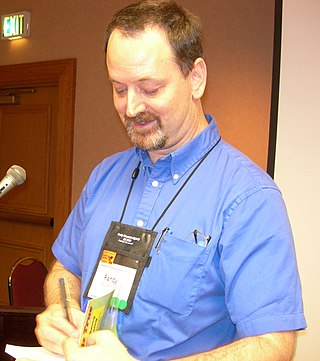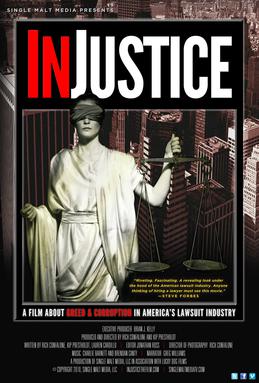Frivolous litigation is the use of legal processes with apparent disregard for the merit of one's own arguments. It includes presenting an argument with reason to know that it would certainly fail, or acting without a basic level of diligence in researching the relevant law and facts. That an argument was lost does not imply the argument was frivolous; a party may present an argument with a low chance of success, so long as it proceeds from applicable law.
Punitive damages, or exemplary damages, are damages assessed in order to punish the defendant for outrageous conduct and/or to reform or deter the defendant and others from engaging in conduct similar to that which formed the basis of the lawsuit. Although the purpose of punitive damages is not to compensate the plaintiff, the plaintiff will receive all or some of the punitive damages in award.
Liebeck v. McDonald's Restaurants, also known as the McDonald's coffee case and the hot coffee lawsuit, was a highly publicized 1994 product liability lawsuit in the United States against the McDonald's restaurant chain.
Halliburton Company is an American multinational corporation and the world's second largest oil service company which is responsible for most of the world's largest fracking operations. It employs approximately 55,000 people through its hundreds of subsidiaries, affiliates, branches, brands, and divisions in more than 70 countries. The company, though incorporated in the United States, has dual headquarters located in Houston and in Dubai.
Malicious prosecution is a common law intentional tort. Like the tort of abuse of process, its elements include (1) intentionally instituting and pursuing a legal action that is (2) brought without probable cause and (3) dismissed in favor of the victim of the malicious prosecution. In some jurisdictions, the term "malicious prosecution" denotes the wrongful initiation of criminal proceedings, while the term "malicious use of process" denotes the wrongful initiation of civil proceedings.

KBR, Inc. is a U.S. based company operating in fields of science, technology and engineering.
Judicial Watch (JW) is a 501(c)(3) nonprofit American conservative activist group that files Freedom of Information Act (FOIA) lawsuits to investigate claimed misconduct by government officials. Founded in 1994, Judicial Watch has primarily targeted Democrats, in particular the administrations of Bill Clinton and Barack Obama, as well as Hillary Clinton's role in them. It was founded by attorney Larry Klayman, and has been led by Tom Fitton since 2003.
Medical malpractice is professional negligence by act or omission by a health care provider in which the treatment provided falls below the accepted standard of practice in the medical community and causes injury or death to the patient, with most cases involving medical error. Claims of medical malpractice, when pursued in US courts, are processed as civil torts. Sometimes an act of medical malpractice will also constitute a criminal act, as in the case of the death of Michael Jackson.

Randy C Cassingham is an American syndicated columnist, humorist, publisher, and speaker. He is a former member of the Society of Professional Journalists. He has been the keynote speaker at several of The Skeptics Society's annual conventions.
A duty to warn is a concept that arises in the law of torts in a number of circumstances, indicating that a party will be held liable for injuries caused to another, where the party had the opportunity to warn the other of a hazard and failed to do so.

Non-economic damages caps are tort reforms to limit damages in lawsuits for subjective, non-pecuniary harms such as pain, suffering, inconvenience, emotional distress, loss of society and companionship, loss of consortium, and loss of enjoyment of life. This is opposed to economic damages, which encompasses pecuniary harms such as medical bills, lost wages, lost future income, loss of use of property, costs of repair or replacement, the economic value of domestic services, and loss of employment or business opportunities. Non-economic damages should not be confused with punitive or exemplary damages, which are awarded purely to penalise defendants and do not aim to compensate either pecuniary or non-pecuniary losses.

Richard George Kopf is a senior United States district judge of the United States District Court for the District of Nebraska.
A personal injury lawyer is a lawyer who provides legal services to those who claim to have been injured, physically or psychologically, as a result of the negligence of another person, company, government agency or any entity. Personal injury lawyers primarily practice in the area of law known as tort law. Examples of common personal injury claims include injuries from slip and fall accidents, traffic collisions, defective products, workplace injuries and professional malpractice.
McDonald's has been involved in a number of lawsuits and other legal cases in the course of the fast food chain's 70-year history. Many of these have involved trademark issues, most of which involving the "Mc" prefix, but McDonald's has also launched a defamation suit which has been described as "the biggest corporate PR disaster in history".

Tort reform consists of changes in the civil justice system in common law countries that aim to reduce the ability of plaintiffs to bring tort litigation or to reduce damages they can receive. Such changes are generally justified under the grounds that litigation is an inefficient means to compensate plaintiffs; that tort law permits frivolous or otherwise undesirable litigation to crowd the court system; or that the fear of litigation can serve to curtail innovation, raise the cost of consumer goods or insurance premiums for suppliers of services, and increase legal costs for businesses. Tort reform has primarily been prominent in common law jurisdictions, where criticism of judge-made rules regarding tort actions manifests in calls for statutory reform by the legislature.
Jamie Leigh Jones is a former employee of KBR, an American engineering, construction and private military contracting company. During her employment, KBR was a subsidiary of Halliburton from 1962 to 2007. She is notable for accusing then fellow KBR employees of drugging and gang-raping her on July 28, 2005, at Camp Hope in Baghdad. A federal grand jury investigated her claims but issued no indictments.
Oliver E. Diaz Jr. is a former Presiding Justice on the Supreme Court of Mississippi representing District 2 Place 2. In 2008, he was defeated by Randy "Bubba" Pierce.

InJustice is a 2011 documentary film produced and directed by Brian Kelly. The film features the impact of tort reform on the United States judicial system. The documentary focuses on how the class action lawsuit, born from the Civil Rights Act of 1964, was skillfully managed by a small group of trial attorneys who manipulated legal rules, procedures — and even their own clients — to become an international enterprise that rivals the scope and profits of Fortune 500 corporations. How lawyers managed to maneuver their way into millions and billions by scamming the judicial system via class action lawsuits.






